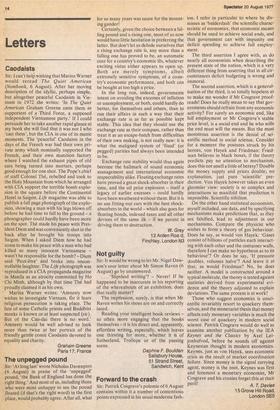Forward to the crash
Sir: Patrick Cosgrave's polemic of 6 August contains within it a number of contentious points expressed in his usual moderate fash ion. I refer in particular to where he dismisses as 'balderdash' the scientific characteristic of economics, that economic means should be used to achieve social ends, and that government can with impunity use deficit spending to achieve full employment.
The third assertion I agree with, as do nearly all economists when describing the present state of the nation, which is a very different thing from asserting that in all circumstances deficit budgeting is wrong and immoral.
The second assertion, which is a generalisation of the third, is so totally hopeless as to make me wonder if Mr Cosgrave proofreads! Does he really mean to say that governments should refrain from any economic activity? For surely an economic end, like full employment or Mr Cosgrave's stable price level, is a social end and he who wills the end must will the means. But the most monstrous assertion is the denial of scientific method in social science. Consider for a moment the postures struck by his heroes, von Hayek and Friedman: Friedman believes in black boxes, if the theory predicts pay no attention to mechanism, does this not smell a little of heresy? Double the money supply and prices double; no explanation, just pure 'scientific' prediction. Von Hayek however takes an even gloomier view: society is so complex and interactions so manifold that prediction is impossible. Scientific nihilism.
On the other hand statistical economists, myself included, use data, and by specifying mechanisms make predictions that, as they are falsified, lead to adjustment in our mechanisms. Compare the physicist who wishes to form a theory of gas behaviour. Does he say, as would von Hayek: 'Gases consist of billions of particles each interacting with each other and the container walls, therefore I can make no hypothesis as to its behaviour'? Or does he say, `If pressure doubles, volumes halve'? And leave it at that, as would Friedman? No, he does neither. A model is constructed around a typical molecule, the theory is tested against statistics derived from experimental evidence and the theory adjusted to explain deviations. The same process is at work!
Those who suggest economics is unscientific invariably resort to quackery themselves, and the monetarist thesis that money affects only monetary variables is much the worst case of quackery in modern social science. Patrick Cosgrave would do well to examine another publication by the !EA Keynes and the Classics by Axel Leijonhufvod, before he sounds off against Keynesian thought in modern economics. Keynes, just as von Hayek, sees economic crisis as the result of market coordination failure. Since money is the signal carrying agent, money is the root. Keynes was first and foremost a monetary economist, Mr Cosgrave and his cronies forget this at their peril! A. T. Davies 15 Grove Hill Road, London SE5































 Previous page
Previous page